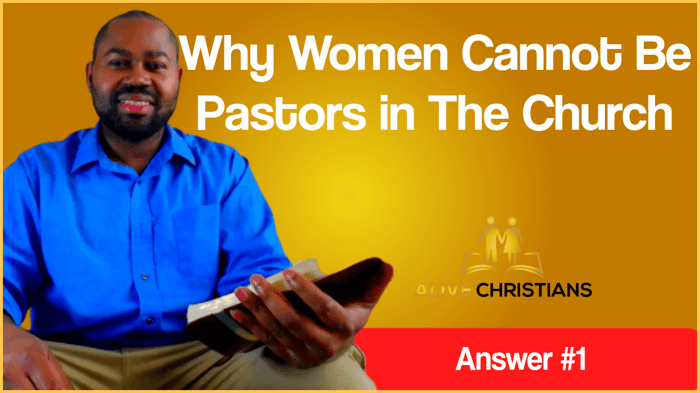Table of Contents
- So we know that the exception clause must mean something that would not contradict what He shared elsewhere.
- So in a forbidden marriage(fornication) the two are not one, they are still two, and therefore can be put asunder!
- So when The Lord Jesus says, except for fornication, he's not giving an escape from a lawful marriage. He's giving an escape from an unlawful marriage.
- Augustine (De Adulterinis Coniugiis 1.9)
- Jerome (Commentary on Matthew 19:9)
- Chrysostom (Homilies on Matthew 62.1)
- And this pulls everything together here in the Scriptures, where a fornication marriage is an unlawful marriage and MUST be Forsaken, but every lawful marriage is until death, just as the Lord Jesus says in The Gospels.
- Church Fathers on Unlawful Marriages & Remarriage
- Can a man marry a man and that be seen in the sight of God as marriage?
- Can a woman that has married a divorced man remarry if she divorces him?
- What about if a brother and sister get married without the awareness that they were siblings? Is that marriage sanctioned by God?
- Can a spouse divorce their spouse for adultery that's committed within the marriage?
- Adultery and Divorce Do Not End A Legal Marriage.
- Fornication Seems To Focus On Relational State
- Adultery Through Remarriage Should Be Ended Through Divorce To The Unlawful Spouse
- 1. Apostolic Constitutions (late 4th century)
- 2. Council of Elvira (c. 306 A.D.)
- 3. Jerome (c. 347–420)
- 4. Theodoret of Cyrus (c. 393–466)
- 5. Canonical Epistles of St. Basil (expanded)
- 6. Ambrosiaster (Pseudo-Ambrose, c. 366–384)
- Scriptures on Divorce and Remarriage
- Luke 16:18
- 1 Peter 3:1
- Deuteronomy 22:19
- Matthew 19:9
- Matthew 5:32
- Genesis 2:24
- Deuteronomy 22:29
- 1 Corinthians 7:10-11
- Matthew 5:31-32
- Jeremiah 3:1
- Mark 10:11
- 1 Corinthians 7:15
- Mark 10:2-12
- Malachi 2:16
- Matthew 19:6
- Matthew 1:19
- Mark 10:12
- 1 Corinthians 7:39
- Mark 10:2
- 1 Corinthians 7:11
- Ephesians 5:33
- Romans 7:2
- Matthew 19:8
- Matthew 19:6-7
- Deuteronomy 24:1-3
- Leviticus 21:7
- Romans 7:2-3
- Isaiah 50:1
- Leviticus 21:14
- 1 John 2:3-4
- Jeremiah 3:8
- Isaiah 54:6
- Matthew 5:31
- Numbers 30:9
- Matthew 19:7
- Leviticus 22:13
- Mark 10:4
- 1 Corinthians 7:10-17
- 1 Corinthians 7:11-13
- Hebrews 13:4
- Exodus 14:14
- 1 Corinthians 7:12
- FAQs
What does the Bible say about divorce and remarriage?
Use our table of contents above to go directly to our KJV Bible verses about divorce and remarriage, but if you want to get answers on the divorce, remarriage issues that are rampant in the Church read my article below on the exception clause and if it's lawful to marry after divorce. I really put alot of study and effort into this one for you, so enjoy. We cover bible passages on divorce, the topic of "Paul's exception," and remarriage texts.
Here's the Bible on Divorce and Remarriage - The Whole Truth.
 The main text that we have to look at in order to understand the topic of divorce and remarriage and all of the different nuances that can come in between is The Lord's commandment.
The main text that we have to look at in order to understand the topic of divorce and remarriage and all of the different nuances that can come in between is The Lord's commandment.
Matthew 19:9 And I say unto you, Whosoever shall put away his wife, except it be for fornication, and shall marry another, committeth adultery: and whosoever marrieth her which is put away doth commit adultery.
As we look and meditate at the Lord's commandment, we'll be able to know exactly what He means.
Psalm 119:130 The entrance of thy words giveth light; it giveth understanding unto the simple. Now, when the text about fornication comes up (the exception clause), many people say, Oh, it's for adultery in the marriage that they can divorce, or if the person goes out on the spouse and has sex with somebody else.
But I submit to you that the Lord Jesus didn't use the word for adultery in the exception, and in the same text, he uses the particular word used specifically for adultery to refer to when you marry another.
This specific use here would imply that fornication and adultery are different or that each should have its own, distinct textual treatment. And to be faithful to Scriptural exegesis, this is exactly what has to be done, given the Lord's distinction in His choice of words, but more on this to come.
We're going to let The Bible interpret The Bible.
The main passage that for a long time I overlooked, is the passage when He gives the commandment, somewhat independently of his divorce and remarriage decrees, when he said, For this purpose, does a man leave his father and mother and cleave unto his wife, and the two shall become one.
This based on Genesis 2:23-25
23 The man said,
“This is now bone of my bones
and flesh of my flesh;
she shall be called ‘woman,’
for she was taken out of man.”
24 That is why a man leaves his father and mother and is united to his wife, and they become one flesh.
25 Adam and his wife were both naked, and they felt no shame.
The Lord Jesus goes on to say something very powerful, and this is the basis of what He shares concerning divorce, marriage and all of that. Ready? Here it is:
What God has joined together, let no man put asunder.
This is the basis for everything mentioned in Scripture concerning divorce and remarriage. I never even saw it as a commandment from the Lord before, but it is! To confirm this, we know, the apostle Paul shares that the woman is bound to the law of her husband as long as he lives 
Do you see the undertones of The Lord's words, Whom God has joined together, let no man put asunder? Notice, death separates the spouses. And who is in charge of death? God is.
- Deuteronomy 32:39 “‘See now that I, even I, am He, and there is no god besides Me. I kill, and I make alive; I wound, and I heal; neither is there any that can deliver out of My hand.
- Job 14:5 A person’s days are determined; you have decreed the number of his months and have set limits he cannot exceed.
- Psalm 139:16 Your eyes saw my unformed body; all the days ordained for me were written in your book before one of them came to be.
So when someone, who was married, dies, it is God's ultimate decision that unbinds them from their spouse.
In many instances, in the Scripture, even in the book of Mark and other places where the Lord Jesus refers to divorce, he doesn't even mention the fornication exception clause. Again, this has significance.
So it must mean, that once married to an individual, that the marriage is until death because we know that the Bible says, Let every word be established by two or three witnesses. 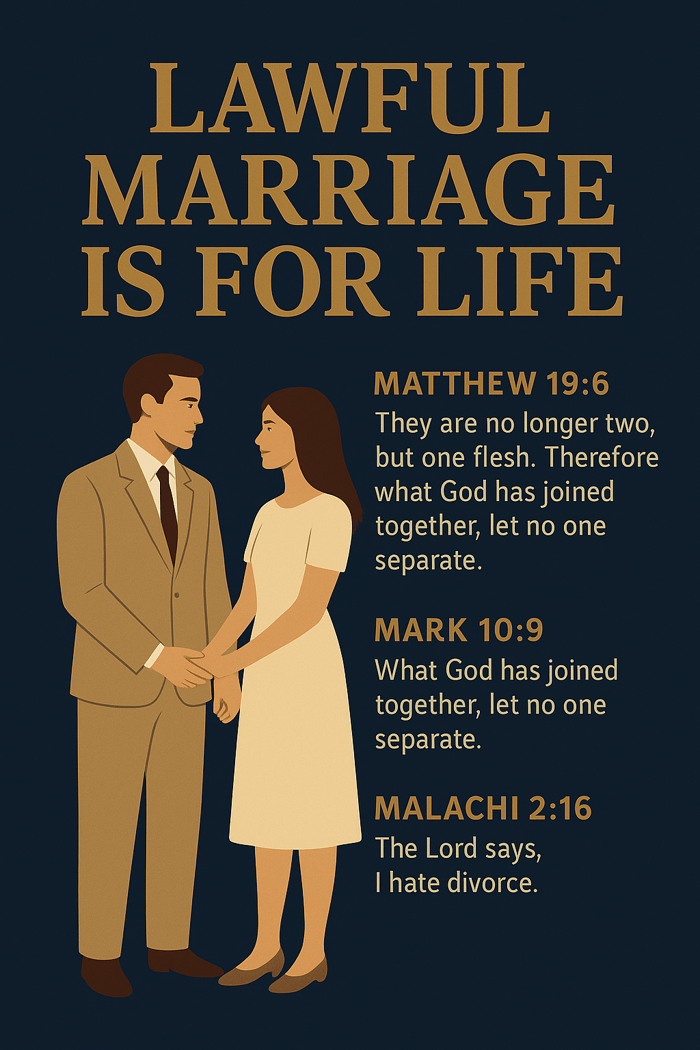
The Lord Jesus Himself, in different areas of Scripture, says, if a man divorces his wife and marries another, he commits adultery. And He says so plainly without the exception clause!
So we know that the exception clause must mean something that would not contradict what He shared elsewhere.
And lots of people put in their interpretation, but, many times their interpretations go against Scripture. If you say somebody can divorce if a spouse commits adultery in the marriage, that goes against the Scripture, because the Lord commands, whom God has joined together, let no man put asunder.
If somebody commits adultery, there is forgiveness. That's something that's supposed to be applied. There is forgiveness, steps forward, marriage counseling, prayer, etc. if somebody commits adultery.
Adultery in a marriage doesn't dissolve the marriage, because the only way that a lawful marriage is dissolved in the sight of God is if one of the spouses dies.

 Death is when God separates a lawfully married couple.
Death is when God separates a lawfully married couple.
And we know this through the Apostle Paul, and we see the evidence of this when the Lord Jesus says if you divorce and then remarry another, then you commit adultery, implying that you are still married to your first lawful spouse.
Remember the premise for the Lord's marriage commandment is whom God has joined together, let no man put asunder.
So we have to understand what fornication actually means in order for it to make sense with all the other Scriptures that clearly say that divorcing a spouse and subsequent remarriage after that divorce to another person is, in fact, the sin called adultery.
We have to marry the texts, pun intended.
The text can't say something that is different from what the Lord Jesus was saying in every other Gospel.
And what we know is that the text does not say something different from what the Lord Jesus says in other areas and what the Apostle Paul says in many different areas.
And so to solve this dilemma and to find harmony in what the Scriptures actually mean we have to go to the Book of Leviticus. 
In the Book of Leviticus, the Bible clearly enunciates fornication, or things that cause uncleanness and defilement. English translations very often refer to them as abominations.
Again we know with proof that fornication or forbidden relationships outside of lawful marriage are seen as fornication in the New Testament because, the apostle Paul calls it fornication when a man took his father's wife which is forbidden in the book of Leviticus. He didn't refer to it as adultery, but called it fornication, because this relationship is forbidden or unlawful. When the Apostles gave the Apostle Paul instructions concerning what the Gentiles are to do they extracted instructions directly from the Book of Leviticus and included the instruction for the Gentiles to avoid fornication just as the book of Leviticus itemizes.
So we know that the Levitical laws as mentioned by the apostles in Scripture apply for believers today with regards to this topic of fornication and we know the book of the bible that outlines what fornication is because the Apostles referred to it.
These fornication/forbidden relationships are found in Leviticus 18.
Remember, the The Lord Jesus' foundational commandment, "Whom God has joined together, let no one put asunder" cannot be broken, or else that would be sin. This is the commandment that governs everything that He said concerning marriage and divorce.
So since He says except for fornication, divorce and remarriage is sinful, it must follow that in the case of fornication the two are not one, because from the time that God puts two together, they are one until God separates them.
So The Lord Jesus would never say, except for fornication to dissolve the marriage, or for there to be a divorce if God Himself didn't separate them. Because He would be making a command against His command, and God is not the author of confusion! Remember, I only do what I see my Father doing. So if God doesn't, neither should we. And He doesn't separate until death.
When we look at the book of Leviticus, fornication relationships or marriages are forbidden by God. They are sin. They are abominations. Since we know that God cannot sin, and He does no sin, God cannot and will not join two people together as one in a forbidden marriage!
So in a forbidden marriage(fornication) the two are not one, they are still two, and therefore can be put asunder!
Putting asunder a fornication marriage would not violate the Lord's commandment of "Therefore whom God has joined together, let no one put asunder." because they cannot be joined by God, for they are forbidden to be joined by God Himself!
In other words, the Lord did not make them one, therefore the relationship has not been ratified and therefore can be dissolved, just as the Lord Jesus says in the book of Matthew.
Let's be clear: Any marriage that has been entered into in disagreement with the Word of God and as an abomination or fornication, as clearly outlined in the Book of Leviticus, is a marriage that can be dissolved because it was never ratified by God, and the two are still two and not one, for God cannot sin and make them one when He forbade the relationship. Fornication Marriages are unlawful marriages and are not authorized, neither are they legally binding. In fact, we are commanded to flee fornication! 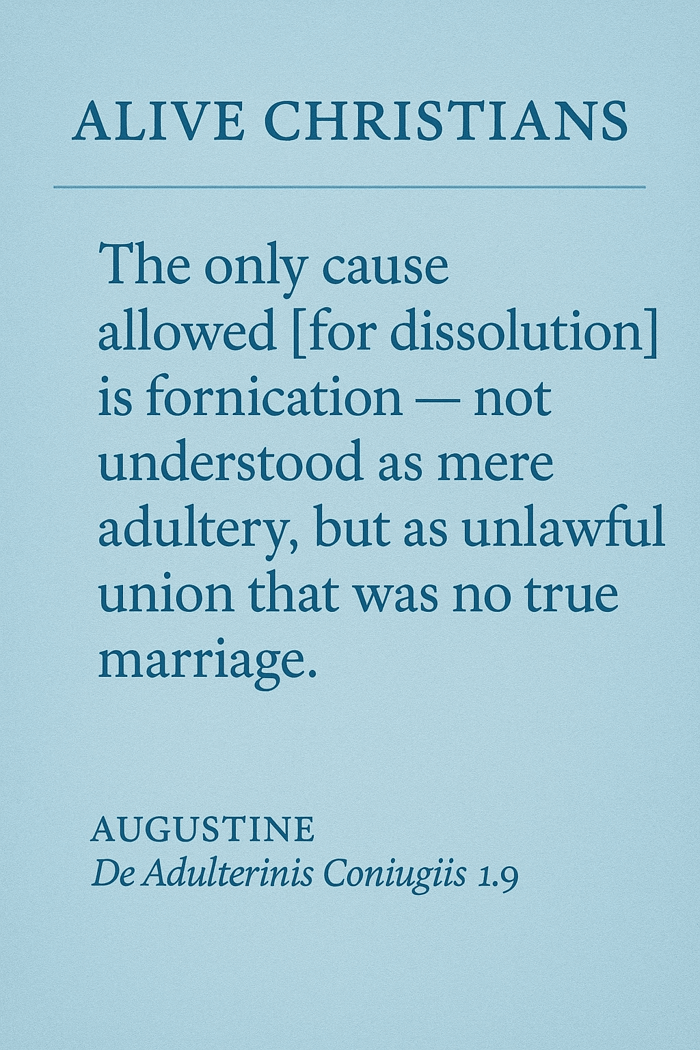
So when The Lord Jesus says, except for fornication, he's not giving an escape from a lawful marriage. He's giving an escape from an unlawful marriage.
That's the difference. He's not contradicting what He's saying by saying except fornication. 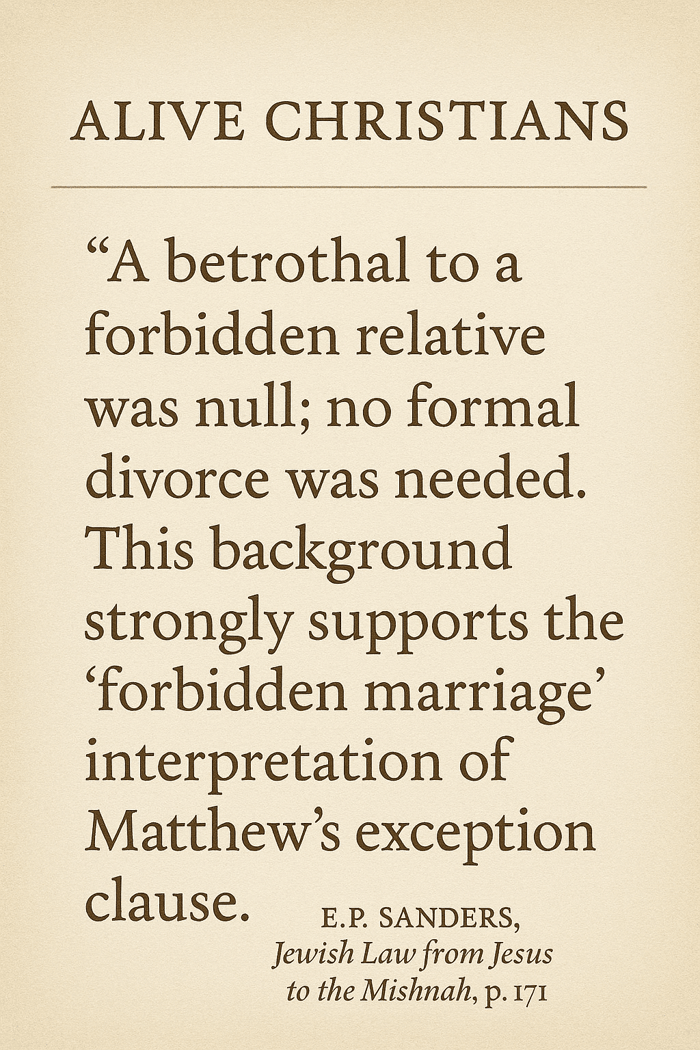
Also when we look at the text, the text there could also be translated instead of except for fornication, as not for fornication or not in fornication. So The Lord is saying that His statement doesn't apply to the wife for fornication, the fornication wife or an unlawful spouse.
He's saying that that type of marriage (a forbidden/fornication marriage) is unlawful, therefore, that can be divorced (and should be dissolved), but a lawful marriage, where God has made the two one cannot be dissolved or divorce should not happen in that case, because whom God has joined together, let no man put asunder.
Augustine (De Adulterinis Coniugiis 1.9)
“The only cause allowed [for dissolution] is fornication — not understood as mere adultery, but as unlawful union that was no true marriage.”
Jerome (Commentary on Matthew 19:9)
“Porneia signifies not every sin of the flesh, but those unions forbidden by the Law… such marriages are not marriages.”
Chrysostom (Homilies on Matthew 62.1)
“Christ permits separation only for fornication — that is, for a union which is itself unclean and unlawful.”
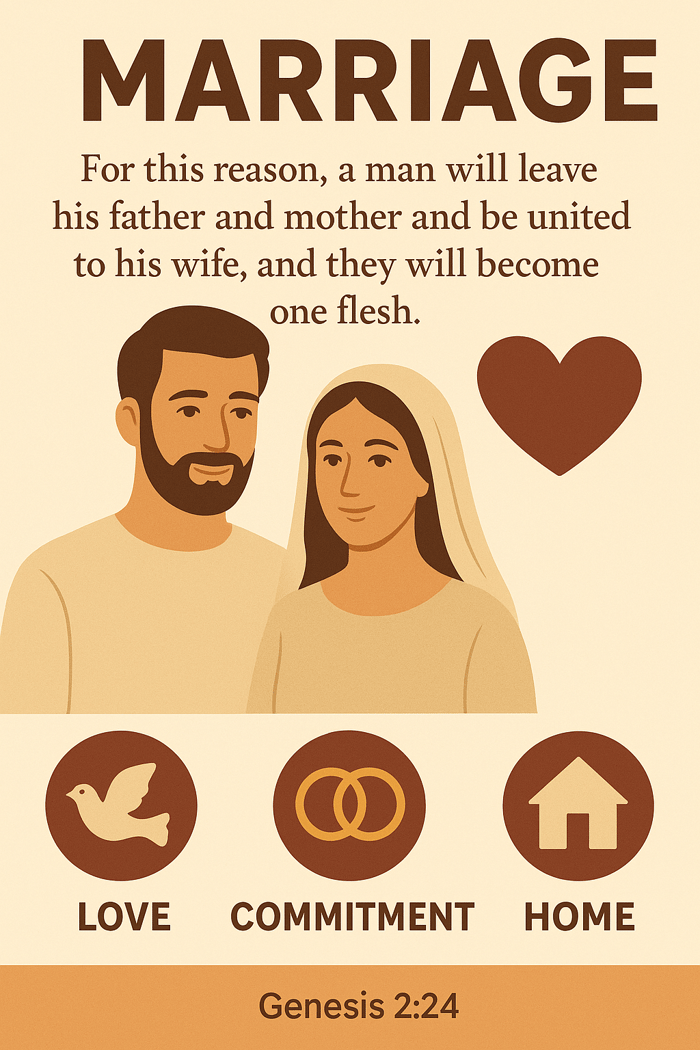
As The Apostle Paul says,
2 But since sexual immorality (fornication) is occurring, each man should have sexual relations with his own wife, and each woman with her own husband. (1 Corinthians 7:2)
See, the solution for fornication is lawful marriage. So how could the Lord say if your lawful spouse fornicates divorce them when the solution to fornication is a lawful spouse!
And here we see the scriptures come full circle where fornication is an abomination and is not ratified by God as a marriage, therefore it can be dissolved, and those in a forbidden, unlawful marriage can (and should) be divorced since we are commanded by God in Scripture to flee fornication.
Inherently, people who have divorced from an unlawful marriage who were never at any time married lawfully would not be in sin to marry another in the Lord (lawfully), because God had never made them one with anybody else before. 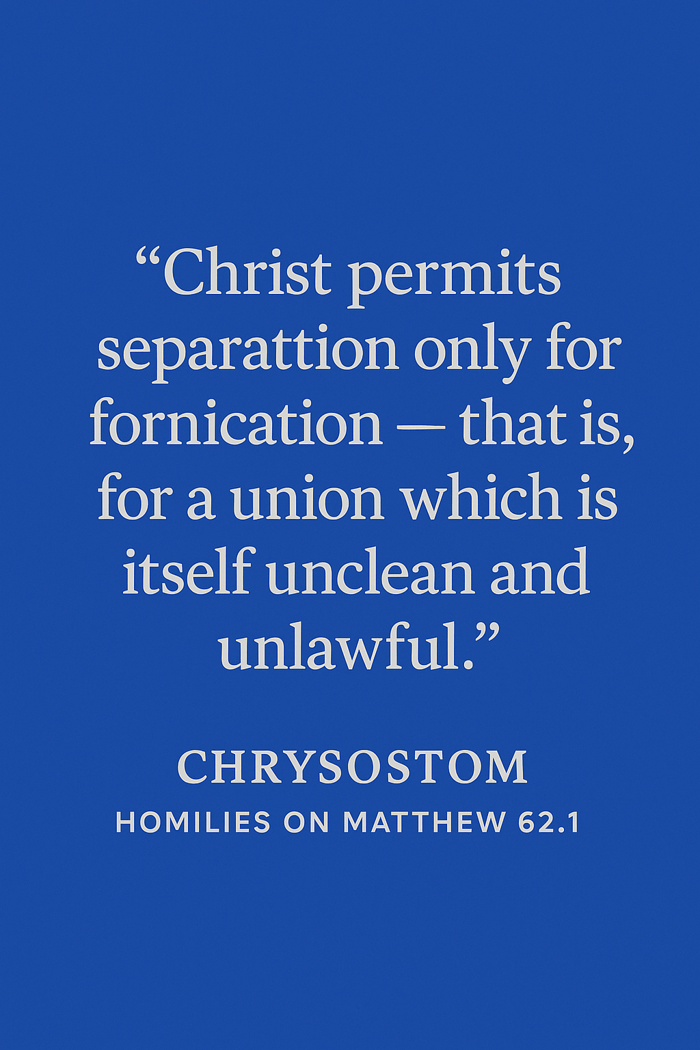
As The Apostle Paul says,
2 But since sexual immorality (fornication) is occurring, each man should have sexual relations with his own wife, and each woman with her own husband.
Notice, in abandoning fornication, each man is to have his own wife and each woman is to have her own husband. Again, The Lord Jesus' exception of fornication is confirmed because even if a lawful marriage ends in divorce, the spouses can only be remarried to each other to avoid fornication, because as long as they both are alive they remain legally husband and wife in God's eyes. Getting married to another would be adultery.
Marriage is honorable among all, and the bed undefiled; but fornicators and adulterers God will judge. (Hebrews 13:4)
Notice in stating who dishonors marriage and defiles the marriage bed, Holy Scripture mentions fornicators (pornos) and adulterers (moichos). This proves that the Lord Jesus choice of porneia in Matthew 19:9 is to single out marriages of fornication vs lawful marriages where someone commits adultery because when He mentions lusting after another woman while lawfully married in Matthew 5:28, which is adultery, he does not use the word porneia; The Lord Jesus uses the word moicheuó from the word for adulterer moichos.
This proves that The Lord's choice of porneia is not referring to adultery by a lawful spouse but an unlawful, fornication marriage.
Phone users: you may have to turn your phone horizontally to widen or view this image of the quote from very early in the Church's history.

And this pulls everything together here in the Scriptures, where a fornication marriage is an unlawful marriage and MUST be Forsaken, but every lawful marriage is until death, just as the Lord Jesus says in The Gospels.
If a man divorced his wife, and marries someone else he commits adultery, that's with lawful marriage. But if a brother and a sister marry in an unlawful, abomination, fornication marriage that marriage can and should be dissolved as we are commanded to flee fornication, and they can remarry lawfully.
And again, this also reminds me of the Apostle Paul's admonition, and if the spouse dies, that the person is to remarry in the Lord. Now, it's important to recognize that in the Lord's statement there, because it not only refers to marrying a believer, but it refers to marrying according to the plans of God and to His laws. So if a spouse dies, the person can't go and marry a man if they're a man - that wouldn't be considered a lawful, ratified marriage. They can't go and marry a biological sister or a brother. That wouldn't be a considered lawful, ratified marriage. Neither can a person marry someone that was lawfully married before while their lawful spouse is still alive.
It won't be a lawful marriage. That's why the Apostle Paul says in the Lord to in effect say, flee fornication; which was one of the tenets that the Apostles gave the Apostle Paul as something to tell the Gentiles- Flee or Avoid fornication. 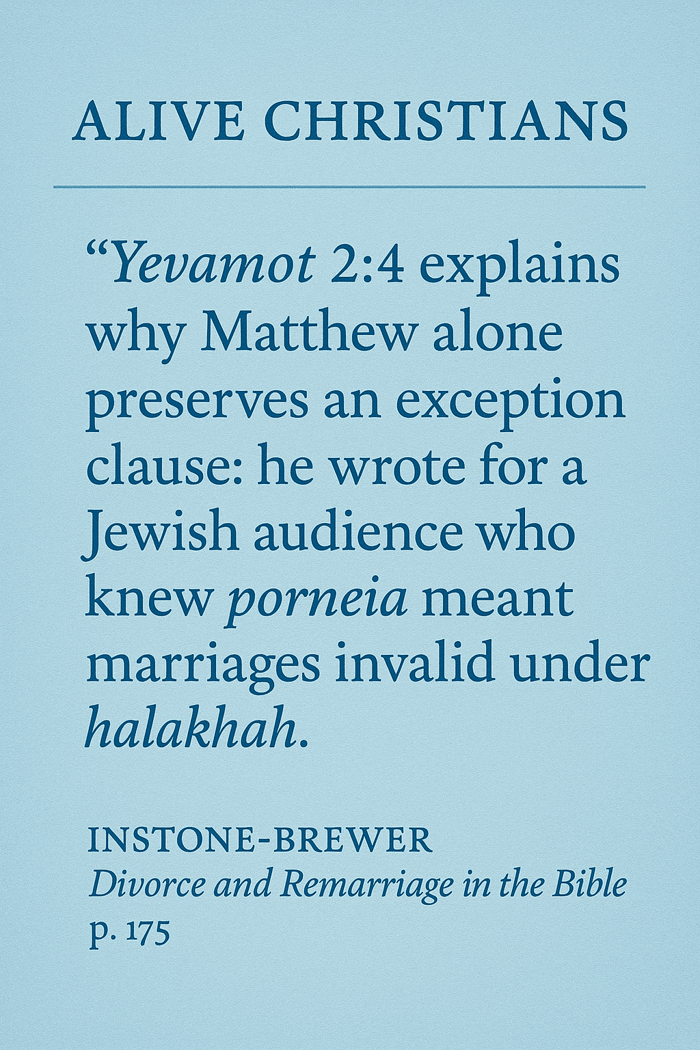
So with the exception clause, The Lord Jesus was addressing fornication as not lawful and therefore not binding and should be fled from through divorce. And in those cases, those individuals can lawfully marry another person since this would not break the commandment of the Lord since they were not joined together as one flesh by God in the unlawful or forbidden marriage. This is ofcourse assuming they weren't married lawfully to someone else prior to the unlawful marriage. If married lawfully (in agreement with the prohibitions) they would not be able to remarry someone else (other than their lawful spouse) as long as their lawful spouse is alive.
Scholarly comment:
E.P. Sanders, Jewish Law from Jesus to the Mishnah, p. 171: “A betrothal to a forbidden relative was null; no formal divorce was needed. This background strongly supports the ‘forbidden marriage’ interpretation of Matthew’s exception clause.”
Instone-Brewer, Divorce and Remarriage in the Bible, p. 175: “Yevamot 2:4 explains why Matthew alone preserves an exception clause: he wrote for a Jewish audience who knew porneia meant marriages invalid under halakhah.”

In fact, here's the consensus on this matter from the Early Church fathers:
Church Fathers on Unlawful Marriages & Remarriage
| Source | View on Unlawful / Incestuous Unions (Porneia) | View on Remarriage After Such Unions |
|---|---|---|
| Hermas (c. 100–150, Shepherd, Mandate 4) | Adultery is cause for separation, but he treats valid marriage as binding. | No remarriage after valid marriage; silence on unlawful unions. |
| Justin Martyr (c. 100–165, First Apology 15) | Defines porneia as sexual sin; condemned remarriage after divorce in valid marriages. | No remarriage after valid marriage; no detailed comment on unlawful unions. |
| Origen (185–254, Commentary on Matthew 14.23) | Porneia = unlawful marriages (incest, forbidden unions) — not true marriages. | Remarriage valid — not adultery, since no true bond existed. |
| Tertullian (c. 160–220, On Monogamy 9) | Strong stance against remarriage in lawful unions. | No remarriage in valid marriages; unlawful unions implicitly excluded from “marriage.” |
| Council of Elvira (c. 305, Canon 9) | Forbids marriage within certain kinship; calls such unions fornication. | Declares such unions invalid, separation required; remarriage allowed afterward. |
| St. Basil the Great (330–379, Canonical Epistle 9) | “Unlawful joining is fornication, not marriage.” | Remarriage valid after such unions. |
| St. Athanasius (c. 295–373, Letter to Ammoun) | Treats unlawful marriages as fornication. | Implies remarriage possible since unlawful union not binding. |
| St. John Chrysostom (349–407, Homily on Matthew 62.1) | Explicit: incestuous unions (sister, daughter-in-law) are not marriages. | Remarriage valid after separation — no adultery. |
| St. Ambrose of Milan (c. 340–397, Letter 19 to Vigilius) | Unlawful unions not true marriages, but fornication. | Remarriage permitted after leaving unlawful union. |
| St. Jerome (347–420, Against Jovinianus 1.7) | Divorce permitted only for unlawful marriage (“not matrimony”). | Remarriage valid if unlawful union is dissolved. |
| Council of Carthage (419, Canon 102) | Forbids unlawful marriages (especially within kinship). | Confirms invalid unions can be dissolved; lawful remarriage permitted. |
| St. Augustine (354–430, On Adulterous Marriages 1.9) | Porneia = unlawful marriage; bond never existed. | Remarriage valid; not adultery, since first union void. |
| St. Leo the Great (c. 400–461, Letter 167) | Forbids incestuous unions; not valid marriages. | Remarriage valid, because separation is from fornication not marriage. |
| Council in Trullo (Quinisext, 692, Canon 54) | Explicitly condemns incestuous marriages as fornication, not matrimony. | Declares such unions void; remarriage valid afterward. |
Based on their writings, here are a few conclusions:
Unlawful unions (incest/forbidden degrees) = fornication, not marriage.
Dissolving such unions is not divorce but correction.
Remarriage after unlawful unions is valid — not adultery, because no real marriage bond ever existed.
Lawful marriages are indissoluble — separation may be allowed for adultery, but no remarriage while spouse lives.
Lawful marriages are joined together as one flesh by God and are until death or (rapture) resurrection. Unlawful marriages however are not joined together as one flesh by God because God cannot sin, and these marriages are unbound by God, not lawful and are not until death. Again, these forbidden marriages should be forsaken according to Scripture.
Can a man marry a man and that be seen in the sight of God as marriage?
No, it will never, ever be seen in the sight of God as marriage. For indeed, in the Book of Leviticus18:22 The scripture says, thou shall not lie with mankind as with womankind. It is an abomination.
And abominations are in line with what The Scriptures call fornication. And so a man being married to a man is seen as fornication and idolatry, because it misrepresents God and it purports to sanction something that God has not sanctioned, meaning it's an idolatrous form of worship.
So a man being married to a man is fornication, and in this case, these men can and are commanded to divorce, and it will not be sinful for them to get remarried to a woman that has not been lawfully married and does not fall under the Levitical laws as something forbidden by God.
So if a homosexual marriage is dissolved, those men are free to remarry women, but only, of course, in the Lord meaning only based on what God has allowed.
Can a woman that has married a divorced man remarry if she divorces him?
Yes, she can remarry, because the marriage to a lawfully married man (whose lawful spouse is alive) who is divorced is adultery, and it is forbidden under the Levitical laws for that marriage to be sanctioned by God because God made the divorced man to be one with his wife, so he cannot, if that spouse is still alive, now join that man to another woman.
No, the two become one flesh, and because the two become one flesh, the divorced man is still married to his lawful spouse.
Therefore the present marriage is considered to be fornication and it is not binding. God has not bound the new couple together.
God doesn't condone sin, so breaking His commandment to keep another does not work, for a little leaven leavens the whole lump. This is part of why the Lord gave this understanding of the exception of fornication. This way, we understand that unlawful and forbidden relationships are not joined by God because God does not and cannot sin. And joining a sinful relationship is not what He does at all.
Unlawful marriages are not bound by God, only lawful ones.
And so divorce is permitted in those cases where it is considered fornication, and the woman can remarry because she entered into a sinful, forbidden relationship that is not joined as one by God, and so it is not binding on her, because God has not bound her to that man.
What about if a brother and sister get married without the awareness that they were siblings? Is that marriage sanctioned by God?
No, it is not. It is fornication, and it's prohibited in the Levitical laws.
And, we see that the same Levitical law is upheld by the apostles in the different chapters, of Scripture like the book of Acts 15:29 and in Acts 21:25 and so incestual relationships of different kinds are considered fornication.
And in this case, these people are not bound together by God, because they're in an illicit relationship that is explicitly and expressly forbidden by God.
Thus to flee fornication, which is commanded by God, they are to divorce, and if they so choose, they are able to get remarried because the relationship that they entered into was explicitly forbidden by God and thus not binding. So they can get married to a lawful spouse, ie.( their own lawfully and no one else's)
Can a spouse divorce their spouse for adultery that's committed within the marriage?
Let's say one of the spouses went out on the other person can the innocent party divorce and then get remarried.
The answer to that is NO and yes.
In that instance, divorce is not sanctioned by God, because the marriage has been bound by God, and to disallow what God has allowed, or to annul what God has joined together, is explicitly against the will of God or sin.
So when the person is married to that person, and God Himself approves of that marriage (no Leviticus 18 prohibitions), they are married for life.
So adultery, in that instance, would not be something that would legally in the sight of God, be permitted to cause divorce. Nothing is permitted for divorce in a lawful marriage!
But, can the person divorce her spouse? Yes.
And in those cases the Apostle Paul says, The Lord gives an instruction:
10 And unto the married I command, yet not I, but the Lord, Let not the wife depart from her husband:11 But and if she depart, let her remain unmarried or be reconciled to her husband: and let not the husband put away his wife. (1 Corinthian 7:10-11)

Forgiveness is commanded, but divorce or putting away of the spouse, because that spouse committed adultery in marriage is not a valid or legal qualification for divorce in the sight of God.
Remember, divorce also causes the spouse to commit adultery if the cause is not for a fornication marriage.
Mathew 5:32 But I say unto you, That whosoever shall put away his wife, saving for the cause of fornication, causeth her to commit adultery: and whosoever shall marry her that is divorced committeth adultery.
The Adultery however must be stopped and repented of.
But God has joined the husband and wife and the two have become one flesh until death (separation by God).
This is not to say that your feelings won't be hurt or that it won't be hard to overcome.
But that's a case where the Lord will give you the grace to forgive if you seek Him and ask for it. But legally speaking from the Word of God, divorce is not given in those cases. The sinful act was fornication and adultery, but the marriage itself is not fornication.
It's nowhere in the Levitical texts with regards to that, it's not incestual, it's not homosexuality, it's not bestiality and it's not an unlawful remarriage. One person in the marriage went out on their partner and while that is adultery and it is a sin, adultery, in its raw sense, is not a qualifier for a legal divorce. Because the law of the Lord stands, "What God has joined together, let no one separate."
Since the marriage itself is not an abomination or fornication as outlined in the Levitical laws, the two have become one and are only separated at death or rapture (in the resurrection heaven we're not given in marriage).
If a man is married to his father's wife, just like with Herod being married to his brother's wife, that is fornication. It is explicitly not allowed in the Levitical text. It's seen as fornication, even though it can be considered adultery, and must be forsaken, for we are commanded to flee fornication.
This is why John the Baptist said it is not lawful for Herod to have his brother Philip's wife.
Adultery and Divorce Do Not End A Legal Marriage.
And the proof of that is Herod with Philip's wife. There was adultery, divorce and a remarriage in this case, but Philip's wife was still his wife! Philip and his wife were not separated by God by death. So Herod and Philip's wife were unlawfully married during the lawful marriage of Philip and his wife. Hence, the prophet John The Baptist said it is NOT Lawful.
It is in the fornication bracket because it's clearly outlined in the Levitical laws as a prohibited, unlawful relationship. It's important to realize that these relationships are considered fornication more so because of the relational state, in addition to the act.
Fornication Seems To Focus On Relational State
And so, adultery would not be grounds for divorce, because God has bound the husband and wife together - their relational state is lawful- so they are bound together until God separates them, which is at death.
Can they divorce? They can choose to (not the Lord's command) but they are to remain unmarried if they do, for remarrying another would be adultery for even though divorced they are still married in the sight of God. See the Apostle Paul's instructions from The Lord here:
10 And unto the married I command, yet not I, but the Lord, Let not the wife depart from her husband:11 But and if she depart, let her remain unmarried or be reconciled to her husband: and let not the husband put away his wife. (1 Corinthians 7:10-11)
 Remember the premise for the Lord Jesus' commandment concerning divorce, remarriage, and adultery is the commandment, "Therefore, whom God has joined together, let no one separate."
Remember the premise for the Lord Jesus' commandment concerning divorce, remarriage, and adultery is the commandment, "Therefore, whom God has joined together, let no one separate."
However, in cases where divorce is allowed, it's only because God has not bound the people, because their marriage itself is fornication; they are forbidden and God cannot sin and will not sin by joining them as one.
The Lord Jesus wouldn't tell us that God hates divorce and whom God joined together let no man put asunder, only for Him to tell those whom God joined together to divorce.
But He would and does mention divorce if it's not a lawful marriage and God has not joined the two people together.
The only way out of a legally binding marriage is if a spouse dies, and then the surviving spouse can remarry, since they are no longer bound, but only in the Lord or according to His commandment to flee fornication in all its forms.
Remember marriage is not separated by man, it can only be separated by God who joined it, and that is by death or rapture(resurrection) for we will not all die.
So things have to follow the Scripture, because we clearly see that God is against remarriage to another. But there is an exception and that is when God has not bound the marriage or sanctioned the marriage. When God has not bound the marriage because it's one of the explicitly outlined forbidden relationships in the Levitical text (since they are upheld for New Testament believers by the Lord Jesus and the Apostles), then there can be a putting away of the marriage because it was never bound by God since He explicitly forbade it.
Adultery Through Remarriage Should Be Ended Through Divorce To The Unlawful Spouse
So if a man, for example, marries a woman that was lawfully married and later divorced, he is committing adultery by being married to her. This man cannot stay married to her, because the adulterer shall not inherit the kingdom of God according to Scripture. Bible Verses About Women (Powerful)
Corinthians 6:9-11 Do you not know that the unrighteous will not inherit the kingdom of God? Do not be deceived. Neither fornicators, nor idolaters, nor adulterers, nor homosexuals, nor sodomites, nor thieves, nor covetous, nor drunkards, nor revilers, nor extortioners will inherit the kingdom of God. 11 And such were some of you. But you were washed, but you were sanctified, but you were justified in the name of the Lord Jesus and by the Spirit of our God.
Also see the words of another Church father, Ambrose of Milan, on this topic.

Many people say that they should stay together, after they ask God for forgiveness. But, that would be sinful.
The example of Herod being told that he's in an unlawful marriage and the woman caught in the act of adultery being brought before the Lord Jesus, prove the sinful nature of remaining in an unlawful marriage.
Remember, go and sin no more. To continue to be in a relationship, lust for, and have sex with another person's spouse is sin, and should be discontinued, no matter what man wants to call it. Marriage in an unlawful remarriage would be continual sin, because the state of that sin remains in effect as long as the lawful spouse is alive! Every act of sex or lust in the heart is an act of adultery. The lawful spouse is still alive!
7 So when they continued asking him, he lifted up himself, and said unto them, He that is without sin among you, let him first cast a stone at her.8 And again he stooped down, and wrote on the ground.9 And they which heard it, being convicted by their own conscience, went out one by one, beginning at the eldest, even unto the last: and Jesus was left alone, and the woman standing in the midst.10 When Jesus had lifted up himself, and saw none but the woman, he said unto her, Woman, where are those thine accusers? hath no man condemned thee?11 She said, No man, Lord. And Jesus said unto her, Neither do I condemn thee: go, and sin no more.
Every time an unlawfully remarried couple has sex, or even lustfully think about having sex with each other, they commit adultery. They are not following the Lord's command to go and sin no more.
And so in this case the man is to flee fornication. He is to flee that adulterous relationship and divorce her, because that is not his wife in the sight of God, because he's not bound by God to her. She is bound to her lawful spouse that she divorced as long as he lives!
In the second marriage,(if the first wasn't ended because it was a fornication/forbidden relationship) the man and woman are not bound as one. And therefore, because that is forbidden, to marry your brother's, or someone else's wife, he is to divorce her. He is able to get remarried (if not lawfully married before), because he married someone in the second marriage that was not lawful to marry, ie. not bound to him by God.
A Fornication Marriage is an unlawful marriage in The Bible.
Look at what a Church Father, Basil The Great said about this:

So remarriage after a fornication marriage is lawful for the unbound party because he was never married lawfully (joined as one by God) to anyone else before. The exception clause is for people who are in unlawful marriages so they can get right with God. It is not a license for sin, but a license for righteousness.
Again this is just as John the Baptist was telling Herod that it is unlawful for him to have his brother Philip's wife. The solution to all sin is to go and sin no more.
Someone might say, these are Old Testament laws and they aren't actually binding to the New Testament. But we do see that the apostles see them as binding and The Lord Jesus sees them as binding. We know this because in the book of Acts 15:29 and in the book of Acts 21:25 we see the Levitical laws showing up there. We see the Apostles seeing them as fornication. And as the clear instruction of scripture goes, we are to flee fornication and continue in the Apostle's teachings.
Here are some of the early Church fathers on this topic:
1. Apostolic Constitutions (late 4th century)
Book VI, ch. 17
“If a man has married unlawfully, let him put her away; and if he is free from a true wife, let him marry as is lawful.”
Meaning: Unlawful marriages are not binding, and remarriage is permitted afterward.
2. Council of Elvira (c. 306 A.D.)
Canon 9
“If anyone has married his sister, such a union is to be dissolved, and he who is separated may lawfully marry another.”
Meaning: Direct allowance of remarriage after porneia-type (incestuous) unions.
3. Jerome (c. 347–420)
Against Jovinian, I.7
“Where there is no marriage but fornication, the bond does not hold. When it is dissolved, another marriage is permitted.”
Meaning: Jerome distinguishes between true marriage and porneia; only the former prohibits remarriage.
4. Theodoret of Cyrus (c. 393–466)
Commentary on Matthew 19:9
“By fornication He means unlawful unions, not true marriage. He who departs from such a union may rightly marry another.”
Meaning: Divorce from porneia restores freedom to remarry.
5. Canonical Epistles of St. Basil (expanded)
Letter 188, Canon 9
“Those joined together unlawfully are to be separated, for such is fornication. If he has no other wife, he is permitted a lawful marriage.”
Meaning: Basil repeats his earlier allowance — remarriage possible after porneia is dissolved.
6. Ambrosiaster (Pseudo-Ambrose, c. 366–384)
Commentary on 1 Corinthians 7:15
“If a man has taken a wife not permitted by law, this is fornication. When he puts her away, he is free to marry another, for the former was not a wife.”
Meaning: Clear support for remarriage after unlawful unions.
Again, the Lord Jesus clearly gives the exception clause to forbid relationships that are explicitly forbidden by God in the first place, because they are not lawful.
Know ye not, brethren, (for I speak to them that know the law,) how that the law hath dominion over a man as long as he liveth?
Romans 7:1-3 For the woman which hath an husband is bound by the law to her husband so long as he liveth; but if the husband be dead, she is loosed from the law of her husband. So then if, while her husband liveth, she be married to another man, she shall be called an adulteress: but if her husband be dead, she is free from that law; so that she is no adulteress, though she be married to another man.
The command of the Lord still stands: Whom God has joined together, let no man put asunder.
Lawful marriages are bound by God, legally binding, and are until death, just as the Scriptures command.

Scriptures on Divorce and Remarriage
Marriage, Divorce and Remarriage:
Luke 16:18
Whosoever putteth away his wife, and marrieth another, committeth adultery: and whosoever marrieth her that is put away from her husband committeth adultery.
1 Peter 3:1
Likewise, ye wives, be in subjection to your own husbands; that, if any obey not the word, they also may without the word be won by the conversation of the wives;
Deuteronomy 22:19
And they shall amerce him in an hundred shekels of silver, and give them unto the father of the damsel, because he hath brought up an evil name upon a virgin of Israel: and she shall be his wife; he may not put her away all his days.
Matthew 19:9
And I say unto you, Whosoever shall put away his wife, except it be for fornication, and shall marry another, committeth adultery: and whoso marrieth her which is put away doth commit adultery.
Adultery/divorce Bible Verses:
Matthew 5:32
But I say unto you, That whosoever shall put away his wife, saving for the cause of fornication, causeth her to commit adultery: and whosoever shall marry her that is divorced committeth adultery.
Genesis 2:24
Therefore shall a man leave his father and his mother, and shall cleave unto his wife: and they shall be one flesh.
Deuteronomy 22:29
Then the man that lay with her shall give unto the damsel’s father fifty shekels of silver, and she shall be his wife; because he hath humbled her, he may not put her away all his days.
Bible verse for divorced woman:
1 Corinthians 7:10-11
And unto the married I command, yet not I, but the Lord, Let not the wife depart from her husband: But and if she depart, let her remain unmarried or be reconciled to her husband: and let not the husband put away his wife.
Divorce In The Bible:
Matthew 5:31-32
It hath been said, Whosoever shall put away his wife, let him give her a writing of divorcement: But I say unto you, That whosoever shall put away his wife, saving for the cause of fornication, causeth her to commit adultery: and whosoever shall marry her that is divorced committeth adultery.
Jeremiah 3:1
They say, If a man put away his wife, and she go from him, and become another man’s, shall he return unto her again? shall not that land be greatly polluted? but thou hast played the harlot with many lovers; yet return again to me, saith the Lord.
Mark 10:11
And he saith unto them, Whosoever shall put away his wife, and marry another, committeth adultery against her.
The Pauline Exception or Pauline Privilege Bible Verse:
1 Corinthians 7:15
But if the unbelieving depart, let him depart. A brother or a sister is not under bondage in such cases: but God hath called us to peace.
Bible Verses About Remarriage:
Mark 10:2-12
And the Pharisees came to him, and asked him, Is it lawful for a man to put away his wife? tempting him. And he answered and said unto them, What did Moses command you? And they said, Moses suffered to write a bill of divorcement, and to put her away. And Jesus answered and said unto them, For the hardness of your heart he wrote you this precept. But from the beginning of the creation God made them male and female. For this cause shall a man leave his father and mother, and cleave to his wife; And they twain shall be one flesh: so then they are no more twain, but one flesh. What therefore God hath joined together, let not man put asunder. And in the house his disciples asked him again of the same matter. And he saith unto them, Whosoever shall put away his wife, and marry another,…
Malachi 2:16
For the Lord, the God of Israel, saith that he hateth putting away: for one covereth violence with his garment, saith the Lord of hosts: therefore take heed to your spirit, that ye deal not treacherously.
A great Scripture about divorce and remarriage:
Matthew 19:6
Wherefore they are no more twain, but one flesh. What therefore God hath joined together, let not man put asunder.
Matthew 1:19
Then Joseph her husband, being a just man, and not willing to make her a public example, was minded to put her away privily.
What does Jesus say about divorce and remarriage? :
Mark 10:12
And if a woman shall put away her husband, and be married to another, she committeth adultery.
Divorce Scriptures:
1 Corinthians 7:39
The wife is bound by the law as long as her husband liveth; but if her husband be dead, she is at liberty to be married to whom she will; only in the Lord.
Mark 10:2
And the Pharisees came to him, and asked him, Is it lawful for a man to put away his wife? tempting him.
Bible quotes about divorce:
1 Corinthians 7:11
But and if she depart, let her remain unmarried or be reconciled to her husband: and let not the husband put away his wife.
Ephesians 5:33
Nevertheless let every one of you in particular so love his wife even as himself; and the wife see that she reverence her husband.
Bible Verses for second marriage:
Romans 7:2
For the woman which hath an husband is bound by the law to her husband so long as he liveth; but if the husband be dead, she is loosed from the law of her husband.
Divorce and bible verses to stop divorce:
Matthew 19:8
He saith unto them, Moses because of the hardness of your hearts suffered you to put away your wives: but from the beginning it was not so.
Matthew 19:6-7
Wherefore they are no more twain, but one flesh. What therefore God hath joined together, let not man put asunder. They say unto him, Why did Moses then command to give a writing of divorcement, and to put her away?
Bible verses on remarriage:
Deuteronomy 24:1-3
When a man hath taken a wife, and married her, and it come to pass that she find no favour in his eyes, because he hath found some uncleanness in her: then let him write her a bill of divorcement, and give it in her hand, and send her out of his house. And when she is departed out of his house, she may go and be another man’s wife. And if the latter husband hate her, and write her a bill of divorcement, and giveth it in her hand, and sendeth her out of his house; or if the latter husband die, which took her to be his wife;
Leviticus 21:7
They shall not take a wife that is a whore, or profane; neither shall they take a woman put away from her husband: for he is holy unto his God.
Second Marriage Bible Verses:
Romans 7:2-3
For the woman which hath an husband is bound by the law to her husband so long as he liveth; but if the husband be dead, she is loosed from the law of her husband. So then if, while her husband liveth, she be married to another man, she shall be called an adulteress: but if her husband be dead, she is free from that law; so that she is no adulteress, though she be married to another man.
Isaiah 50:1
Thus saith the Lord, Where is the bill of your mother’s divorcement, whom I have put away? or which of my creditors is it to whom I have sold you? Behold, for your iniquities have ye sold yourselves, and for your transgressions is your mother put away.
Leviticus 21:14
A widow, or a divorced woman, or profane, or an harlot, these shall he not take: but he shall take a virgin of his own people to wife.
Bible Passages About Marriage and Divorce:
1 John 2:3-4
And hereby we do know that we know him, if we keep his commandments. He that saith, I know him, and keepeth not his commandments, is a liar, and the truth is not in him.
Bible verses on divorce and adultery:
Jeremiah 3:8
And I saw, when for all the causes whereby backsliding Israel committed adultery I had put her away, and given her a bill of divorce; yet her treacherous sister Judah feared not, but went and played the harlot also.
Isaiah 54:6
For the Lord hath called thee as a woman forsaken and grieved in spirit, and a wife of youth, when thou wast refused, saith thy God.
Matthew 5:31
It hath been said, Whosoever shall put away his wife, let him give her a writing of divorcement:
Numbers 30:9
But every vow of a widow, and of her that is divorced, wherewith they have bound their souls, shall stand against her.
Matthew 19:7
They say unto him, Why did Moses then command to give a writing of divorcement, and to put her away?
Leviticus 22:13
But if the priest’s daughter be a widow, or divorced, and have no child, and is returned unto her father’s house, as in her youth, she shall eat of her father’s meat: but there shall be no stranger eat thereof.
Divorce Bible Quotes:
Mark 10:4
And they said, Moses suffered to write a bill of divorcement, and to put her away.
Bible passages for divorce recovery:
1 Corinthians 7:10-17
And unto the married I command, yet not I, but the Lord, Let not the wife depart from her husband: But and if she depart, let her remain unmarried or be reconciled to her husband: and let not the husband put away his wife. But to the rest speak I, not the Lord: If any brother hath a wife that believeth not, and she be pleased to dwell with him, let him not put her away. And the woman which hath an husband that believeth not, and if he be pleased to dwell with her, let her not leave him. For the unbelieving husband is sanctified by the wife, and the unbelieving wife is sanctified by the husband: else were your children unclean; but now are they holy. But if the unbelieving depart, let him depart. A brother or a sister is not under bondage in such cases: but God hath called us to peace…
Bible verses about a wife divorcing her husband:
1 Corinthians 7:11-13
But and if she depart, let her remain unmarried or be reconciled to her husband: and let not the husband put away his wife. But to the rest speak I, not the Lord: If any brother hath a wife that believeth not, and she be pleased to dwell with him, let him not put her away. And the woman which hath an husband that believeth not, and if he be pleased to dwell with her, let her not leave him.
Hebrews 13:4
Marriage is honourable in all, and the bed undefiled: but whoremongers and adulterers God will judge.
Exodus 14:14
The Lord shall fight for you, and ye shall hold your peace.
1 Corinthians 7:12
But to the rest speak I, not the Lord: If any brother hath a wife that believeth not, and she be pleased to dwell with him, let him not put her away.
FAQs
Can a person divorce for any reason?
No. A person is only scripturally permitted to divorce if the marriage is in fornication, not adultery. This would include, incest, unlawful marriage etc from Leviticus 18








